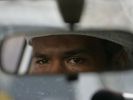Eye For Film >> Movies >> The Oath (2010) Film Review
In The Oath, we see a photograph of a two-day-old laying down next to a machine gun. We see the boy a few years later talking about wanting to be a Jihadi. And it is only a few years later. The boy must be four or five years old when he proclaims this. This material has shock value. It could be badly handled. Thankfully, it's treated sensitively in this low-key, but fascinating, documentary.
The film's main focus are two brothers and their links to Osama bin Laden. One was bin Laden's former driver and the other was the big ObL's bodyguard. The two brothers have a strange relationship, especially as the bodyguard - Abu Jandal - gave much of the evidence which got the other - Salim Hamdam - arrested. Hamdam decides not to appear on camera - in fact, he hasn't given any interviews since his release from jail in early 2009. We get the story from Abu Jandal, himself a former prisoner.

Since his imprisonment in Yemen, and his release in the early Noughties, Jandal has become somewhat of a model citizen. He got a job as a taxi driver, and gives interviews left, right and centre about his terrorist past and connections. However, he isn't about to repeal this entirely - he still holds informal chats with aspiring jihadists, and, of course, has told his son exactly what he expects of him.
The joy of the film is how director Laura Poitras has formed the movie out of interviews with and footage of Jandal. There's the minimum of censoring or scaremongering here. Jandal is a charismatic and articulate guy, and has a lot to say. Of course much of it is problematic. However, you couldn't get a more strangely likeable spokesman for this incredibly complex culture.
What we see is how angry these Jihadists are. We also see some lonely young men, who have been drawn to the lifestyle because it gives them a safety, security and set of otherwise absent father figures. And, according to Jandal, al-Qaeda are changing. It's not for the better, either.
But there are no easy answers here, and director Laura Poitras doesn't give us any conclusions. She lets some ambiguities lie, which may frustrate some viewers. For example, there is no harsh interrogation as to why Jandal has been as open as he has, although it becomes clearer later on in the film. But, overall, it's a worthy follow up and companion piece to her award-winning Iraqi documentary, My Country, My Country.
Reviewed on: 21 Jun 2010
















